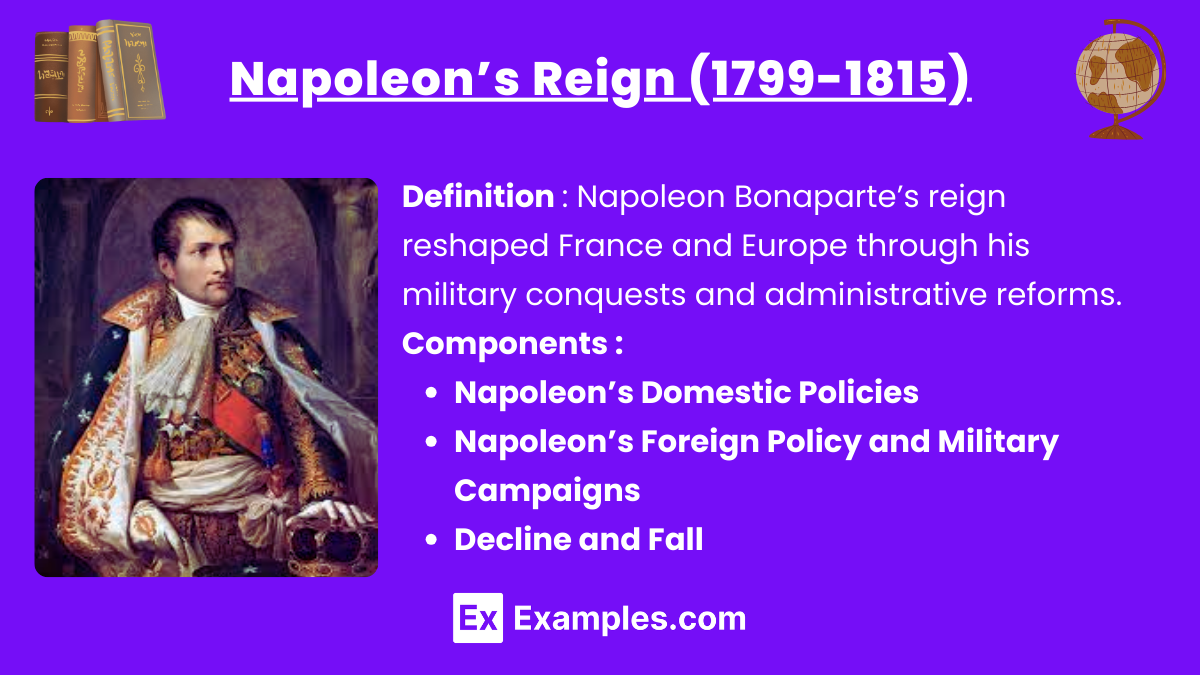The French Revolution (1789-1799), Napoleon’s reign, and the Congress of Vienna (1814-1815) mark a transformative period in European history. The revolution challenged traditional hierarchies and introduced radical political changes. Napoleon Bonaparte’s rule extended these ideas across Europe through military conquests and reforms. The Congress of Vienna sought to restore stability and balance of power after Napoleon’s downfall. Together, these events reshaped the political, social, and cultural landscape of Europe, influencing modern governance and international relations.
Learning Objectives
In studying “The French Revolution, Napoleon’s Reign, and the Congress of Vienna” for the AP European History exam, focus on understanding the causes and key events of the French Revolution, including the social, economic, and ideological factors. Examine Napoleon’s rise to power, his domestic policies, military campaigns, and their impact on Europe. Finally, analyze the goals, key figures, and outcomes of the Congress of Vienna, emphasizing its role in reshaping European borders and maintaining the balance of power. This comprehensive understanding will aid in grasping the transformation of European political landscapes during this era.
The French Revolution (1789-1799)

The French Revolution was a period of radical social and political upheaval in France that had a significant impact on French and world history. It is often divided into three phases:
- Pre-Revolutionary France and the Causes of the Revolution
- Social Inequality: The French society was divided into three estates. The First Estate (clergy) and the Second Estate (nobility) enjoyed numerous privileges, while the Third Estate (commoners) bore the brunt of taxation.
- Economic Hardship: France faced a severe financial crisis due to its involvement in costly wars, including the American Revolution. The government’s debt led to high taxes and food shortages.
- Enlightenment Ideas: Philosophers like Voltaire, Rousseau, and Montesquieu promoted ideas of liberty, equality, and fraternity, challenging traditional hierarchies.
- Estates-General and the National Assembly: In 1789, King Louis XVI called the Estates-General to address the financial crisis. The Third Estate, feeling underrepresented, declared itself the National Assembly, marking the start of the revolution.
- Key Events of the Revolution
- Storming of the Bastille (July 14, 1789): A symbol of royal tyranny, the Bastille was stormed by revolutionaries, signifying the uprising against the monarchy.
- The Declaration of the Rights of Man and of the Citizen: Adopted in August 1789, this document proclaimed the principles of liberty, equality, and fraternity, laying the foundation for a new government.
- The Reign of Terror (1793-1794): Led by the Jacobins under Robespierre, this period was marked by political purges and mass executions, including that of King Louis XVI and Marie Antoinette.
- The Directory and the Rise of Napoleon
- The Directory (1795-1799): A five-member committee that governed France, marked by corruption and political instability.
- Napoleon Bonaparte’s Coup d’État (1799): Napoleon seized power, ending the Revolution and establishing the Consulate, with himself as First Consul.
Napoleon’s Reign (1799-1815)

Napoleon Bonaparte’s reign reshaped France and Europe through his military conquests and administrative reforms.
- Napoleon’s Domestic Policies
- Napoleonic Code (1804): A comprehensive legal code that reformed the French legal system, ensuring equality before the law and securing property rights. It influenced legal systems worldwide.
- Centralization of Power: Napoleon established a centralized administration, standardized education, and reformed the tax system.
- Concordat of 1801: An agreement with the Pope that re-established the Catholic Church in France but kept it under state control.
- Napoleon’s Foreign Policy and Military Campaigns
- Expansion of the French Empire: Napoleon expanded French territory across Europe through a series of military campaigns, including the War of the Third Coalition and the Peninsular War.
- The Continental System: An economic blockade aimed at crippling Britain’s economy by prohibiting European trade with Britain.
- Invasion of Russia (1812): A disastrous campaign that significantly weakened Napoleon’s forces.
- Decline and Fall
- The Battle of Leipzig (1813): Also known as the Battle of Nations, this defeat marked a turning point against Napoleon.
- Exile to Elba and the Hundred Days: After being defeated, Napoleon was exiled to the island of Elba. He escaped, returned to power for a brief period known as the Hundred Days, before being defeated at the Battle of Waterloo (1815).
- Exile to Saint Helena: After Waterloo, Napoleon was exiled to Saint Helena, where he died in 1821.
The Congress of Vienna (1814-1815)
The Congress of Vienna was a diplomatic conference aimed at restoring stability and order in Europe after the Napoleonic Wars.
- Key Objectives
- Balance of Power: To prevent any one nation from becoming too dominant, ensuring long-term peace and stability.
- Restoration of Monarchies: Reinstating old regimes and traditional monarchies to maintain the status quo.
- Territorial Redistributions: Redrawing the map of Europe to strengthen the major powers.
- Major Participants
- Prince Klemens von Metternich (Austria)
- Tsar Alexander I (Russia)
- Lord Castlereagh (Britain)
- Prince Charles Maurice de Talleyrand (France)
- King Frederick William III (Prussia)
- Outcomes and Significance
- Redrawing the Map of Europe: The Congress redefined European borders, compensating the victors and containing France.
- The German Confederation: Established a loose association of 39 German states.
- The Holy Alliance and the Concert of Europe: Alliances formed to maintain the peace and balance of power, preventing the spread of revolutionary ideas.
- Legacy: The Congress established a framework for European international relations, promoting a century of relative peace until World War I.
The French Revolution, Napoleon’s reign, and the Congress of Vienna were pivotal events that reshaped the political and social landscape of Europe. The Revolution introduced ideas of democracy and human rights, while Napoleon’s reforms and military campaigns spread these concepts across the continent. The Congress of Vienna aimed to restore stability and order, setting the stage for 19th-century European diplomacy.
Examples of The French Revolution Napoleon’s reign and the Congress of Vienna
- The Reign of Terror (1793-1794) : During the French Revolution, the Reign of Terror was a period characterized by severe political repression and mass executions. The Committee of Public Safety, led by Robespierre, aimed to eliminate enemies of the revolution.
- Napoleon’s Code (Napoleonic Code) : Napoleon Bonaparte introduced the Napoleonic Code in 1804, a comprehensive legal code that reformed French law. It emphasized clearly written and accessible laws, abolishing feudal privileges and establishing equality before the law.
- The Battle of Waterloo (1815) : The Battle of Waterloo marked the end of Napoleon’s rule. On June 18, 1815, Napoleon was defeated by the Seventh Coalition, led by the Duke of Wellington and Prussian Field Marshal Blücher, which resulted in his exile to Saint Helena.
- The Continental System (1806-1814) : Napoleon implemented the Continental System to weaken the British economy by banning European countries from trading with Britain. However, the blockade harmed European economies more than it did Britain and contributed to Napoleon’s downfall.
- The Congress of Vienna (1814-1815) : After Napoleon’s defeat, the Congress of Vienna was convened to restore balance in Europe. Led by Austrian Chancellor Metternich, the Congress aimed to redraw Europe’s political map, restore monarchies, and establish a balance of power to prevent future conflicts.
Practice Test Questions on The French Revolution Napoleon’s reign and the Congress of Vienna
Question 1 : What was one of the primary goals of the Congress of Vienna in 1815?
A) To spread the ideals of the French Revolution across Europe
B) To restore the balance of power in Europe and prevent future French aggression
C) To promote the industrialization of Europe
D) To establish a democratic government in France
Answer: B) To restore the balance of power in Europe and prevent future French aggression
Explanation: The Congress of Vienna aimed to reestablish stability in Europe after the Napoleonic Wars. The main objective was to create a balance of power that would prevent any one country from dominating the continent, as France had under Napoleon. This involved redrawing the map of Europe, restoring monarchies, and establishing alliances to deter future aggression.
Question 2 : Which of the following was a significant change implemented by Napoleon during his reign?
A) The abolition of the feudal system and the establishment of the Napoleonic Code
B) The implementation of a democratic government with universal suffrage
C) The establishment of a socialist economic system
D) The promotion of isolationist policies in foreign affairs
Answer: A) The abolition of the feudal system and the establishment of the Napoleonic Code
Explanation: Napoleon is known for implementing the Napoleonic Code, which codified many legal reforms that were part of the French Revolution’s legacy. This code abolished feudal privileges, established equality before the law, and protected property rights. It became the foundation of legal systems in many countries and is considered one of Napoleon’s lasting contributions.
Question 3 : How did the French Revolution influence other countries in Europe?
A) It led to widespread support for absolute monarchies
B) It inspired revolutionary movements and the spread of nationalist ideas
C) It caused European nations to adopt French as their official language
D) It resulted in the immediate unification of Germany and Italy
Answer: B) It inspired revolutionary movements and the spread of nationalist ideas
Explanation: The French Revolution had a profound impact on Europe by spreading ideas of liberty, equality, and fraternity. It inspired various revolutionary movements and nationalist sentiments in other countries. People began to challenge traditional monarchies and feudal systems, seeking to establish nations based on citizenship and the will of the people. This led to significant political changes across the continent.


